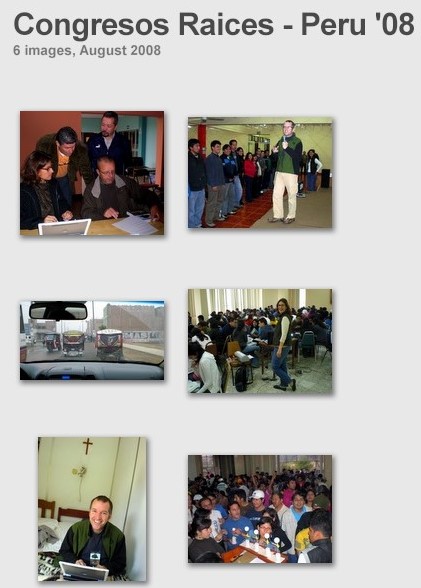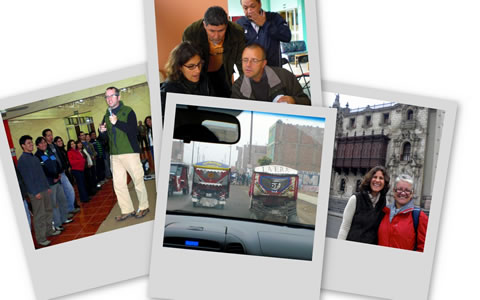 As
we left our apartment for our third major conference in a month, things
felt routine... we've done this so much lately -- packing, traveling, teaching
this material, interacting deeply, intensely with hundreds of youth leaders
over the course of a weekend -- it felt like we had it under control. However
when we arrived at the ticket counter things took an unexpected turn, foreshadowing
what was to come throughout our week in Peru.
As
we left our apartment for our third major conference in a month, things
felt routine... we've done this so much lately -- packing, traveling, teaching
this material, interacting deeply, intensely with hundreds of youth leaders
over the course of a weekend -- it felt like we had it under control. However
when we arrived at the ticket counter things took an unexpected turn, foreshadowing
what was to come throughout our week in Peru.
"That flight is closed,"ť the LAN airline agent at the counter said after pulling up our flight information.
"What? It can't be!"ť was our insightful reply.
Somehow we had mistakenly thought that our flight left at 8:50 p.m. instead of 8:10 which meant we arrived with just under an hour before departure.
The agent, registering the confusion and panic on our faces, not to mention our frequent flier status, checked with his superior and then asked, "Do you have bags to check?"
I don't know when I've been so glad that we now travel with only carry-ons.
"Well,"ť he said shaking his head as he printed our boarding passes, "You're going to have to run. Once the gateway doors close we can't open them again."ť
I thought he was speaking metaphorically, "You need to really hustle"ť, but, no, he meant literally that to reach the gangway in time we would have to run because the gate, number 13 which we'd never flown out of before, was in another terminal at least half a mile away.
The next thirty minutes were incredibly tense: it's been years since we've faced lines as long as the ones that faced us as we tried to pay our exit tax and go through security and immigration. How we got through them is another whole story but suffice it to say that the people around us were very gracious and God answered my desperate prayers in time past by delaying the flight's departure out of Chile two hours previous. (Our hearty apologies to everyone who had to wait on our behalf.)
A few days into our time in Peru I saw that just like we'd gotten lulled into complacency about travel, we've gotten used to smoothly run conferences where we know what is expected of us and how long we have to teach weeks before we arrive. Not so in Peru.
The day before the conference was to start we had a meeting with the organizers after which we learned that we had an hour and a half that evening to prepare fifty volunteers. Needless to say we scrambled a bit that afternoon but it worked out, and those volunteers ended up being incredibly helpful later on.
The conference stood out in some positive ways too.
 For example, it was the first time we have done a Raices conference
in which the attendees have printed copies of the book which was published
two weeks ago. This meant that instead of merely speaking, we could
vary the learning dynamics by having the participants study the text
and then share in their small groups what they had learned. This was
also the first Raíces event where we were given time to facilitate
some learning activities we have been developing over the years. We'd
never done them with such a large group so there were times when we
felt overwhelmed by the chaos. There is no way were could have pulled
off the activities by ourselves, but serendipitously God had those
50 volunteers prepared to help us. Afterwards the feedback
from various leaders reminded us that creating ways for learners to
engage experientially with the material is worth the chaos.
For example, it was the first time we have done a Raices conference
in which the attendees have printed copies of the book which was published
two weeks ago. This meant that instead of merely speaking, we could
vary the learning dynamics by having the participants study the text
and then share in their small groups what they had learned. This was
also the first Raíces event where we were given time to facilitate
some learning activities we have been developing over the years. We'd
never done them with such a large group so there were times when we
felt overwhelmed by the chaos. There is no way were could have pulled
off the activities by ourselves, but serendipitously God had those
50 volunteers prepared to help us. Afterwards the feedback
from various leaders reminded us that creating ways for learners to
engage experientially with the material is worth the chaos.
Despite the emotional rollercoaster of the conference, we have no doubt that it gave both vision and tools to those who attended it. One cell group leader said, "We thought we didn't need any more training, but this weekend I've seen that there is still a lot we need to learn."ť And the organizing committee thought the material was so important that they have asked Tim and me to help them teach it throughout the rest of Peru (about 90% of the participants were from the city of Lima). We don't anticipate being able to make it back to Peru any time soon but between the book, the animated classes, and a new crop of trained leaders, we have the tools to help them create a strategy that could be very effective if they're willing to do the work.